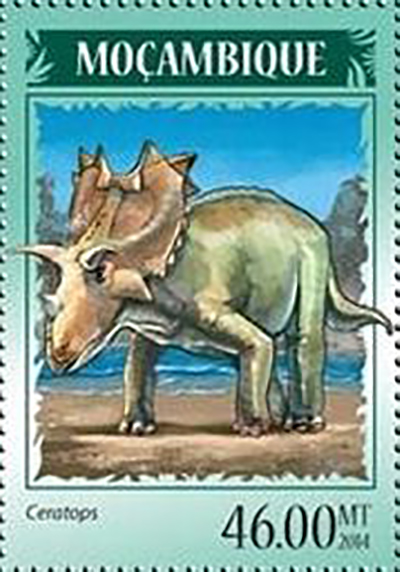Ceratops montanus Marsh, 1888

(Da: www.teratophoneus.deviantart.com)
Phylum: Chordata Haeckel, 1874
Subphylum: Vertebrata Cuvier, 1812
Classe: Dinosauria Owen, 1841
Ordine: Ornithischia Seeley, 1888
Famiglia: Ceratopsidae Marsh, 1890
Genere: Ceratops Marsh, 1888
Descrizione
Descritto da Othniel Charles Marsh nel 1888 sulla base di due piccole corna frontali e frammenti di cranio. Il suo aspetto era praticamente sconosciuto, finché un anno più tardi venne descritto il ben noto triceratopo, sulla base di resti più completi. In sostanza, il ceratopo era un dinosauro quadrupede dal corpo compatto, munito di un becco, di corna e di un collare osseo come tutti i ceratopsidi. L'aspetto di questo animale, a volte ricostruito come un piccolo Triceratops dalle corna corte, non è noto. È possibile che fosse simile al Chasmosaurus o all'Avaceratops, come sembrerebbe suggerire nuovo materiale fossile che forse appartiene a questa specie.
Diffusione
Dinosauro sostanzialmente sconosciuto, ma molto importante perché è stato il primo resto di dinosauro cornuto ad essere riconosciuto come tale e quindi ha dato il nome alla famiglia Ceratopsidae. Questo dinosauro erbivoro è stato rinvenuto in Montana in strati del Cretaceo superiore (Campaniano).
Bibliografia
–O.C. Marsh, 1888, "A new family of horned Dinosauria, from the Cretaceous", The American Journal of Science, series 3 36: 477-478.
–J.B. Hatcher, O.C. Marsh, and R.S. Lull, 1907, The Ceratopsia. Monographs of the United States Geological Survey 49 pp 198.
–Penkalski, P.G., 1993, "The morphology of Avaceratops lammersi, a primitive ceratopsid from the Campanian of Montana", Journal of Vertebrate Paleontology 13(3, supplement): 52°.
–R.S. Lull, 1906, "A new name for the dinosaurian genus Ceratops", The American Journal of Science, series 4 21: 144.
–P. Dodson and P. J. Currie, 1990, "Neoceratopsia". In: D.B. Weishampel, H. Osmolska, and P. Dodson (eds.), The Dinosauria. First Edition. University of California Press, Berkeley pp 593-618.
–Trexler, D. and Sweeney, F.G. (1995). "Preliminary work on a recently discovered ceratopsian (Dinosauria: Ceratopsidae) bonebed from the Judith River Formation of Montana suggests the remains are of Ceratops montanus Marsh." Journal of Vertebrate Paleontology, 15(3, Suppl.): 57A.
–Ryan, Michael J.; Russell, Anthony P., and Hartman, Scott. (2010). "A New Chasmosaurine Ceratopsid from the Judith River Formation, Montana", In: Michael J. Ryan, Brenda J. Chinnery-Allgeier, and David A. Eberth (eds), New Perspectives on Horned Dinosaurs: The Royal Tyrrell Museum Ceratopsian Symposium, Indiana University Press, 656.
–Penkalski, P & Dodson, P (1999). «The morphology and systematics of Avaceratops, a primitive horned dinosaur from the Judith River Formation (Late Campanian) of Montana, with the description of a second skull.». Journal of Vertebrate Paleontology 19 (4): 692-711.
–Marsh, O.C. (1889). «Notice of new American Dinosauria». American Journal of Science 37: 331-336.
–Marsh, O.C. (1889). «Notice of gigantic horned Dinosauria from the Cretaceous». American Journal of Science 38: 173-175.
–Marsh, O.C. (1890). «Description of new dinosaurian reptiles». The American Journal of Science. Series 3 39: 81-86.
–Stanton, T.W.; Hatcher, J.B. (1905). «Geology and paleontology of the Judith River Beds». United States Geological Survey Bulletin 257: 1-174.
–Gregory, W.K.; Mook, C.C. (1925). «On Protoceratops, a primitive ceratopsian dinosaur from the Lower Cretaceous of Mongolia». American Museum Novitates 156: 1-9.
–"Judith the Dinosaur". Accessed 17-AUG-2013.
–Mallon, Jordan C.; Ott, Christopher J.; Larson, Peter L.; Iuliano, Edward M.; Evans, David C.; Evans, Alistair R. (2016). «Spiclypeus shipporum gen. et sp. nov., a Boldly Audacious New Chasmosaurine Ceratopsid (Dinosauria: Ornithischia) from the Judith River Formation (Upper Cretaceous: Campanian) of Montana, USA».
–Abel, O.L.F.A.L., 1919, Die Stämme der Wirbeltiere, Berlin und Leipzig : W. de Gruyter, 914 pp.

|
Data: 30/04/2014
Emissione: Dinosauri Stato: Mozambique Nota: Emesso in un foglietto di 4 v. diversi |
|---|